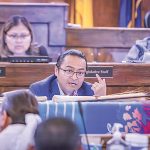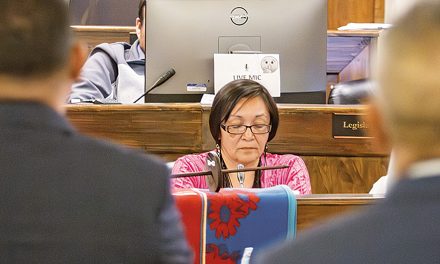
Work continues on payments to enrolled members, chapters
WINDOW ROCK
Last Friday, President Jonathan Nez approved both $49 million in direct hardship relief for enrolled Navajo tribal members (Legislation No. 201) and $90 million for the 110 chapters (Legislation No. 197), which will be administered through Window Rock.
“We understand that there is a great need for financial relief due to the COVID-19 pandemic,” Nez stated in a press announcement. This means that all $714 million of the Coronavirus, Aid, Relief and Economic Stimulus Act funds the Navajo Nation received from the federal government has now been appropriated.
Now the problem is to spend the money by Dec. 30. As of Wednesday, $114.7 million of the total Navajo CARES Act funds appropriated ($537.7 million) have been spent, with $111.9 million, leaving an unspent budget balance of $311.1 million.
The approval of the two bills by Nez appropriates the remaining $176 million in the Navajo CARES Act Fund pot. Legislation No. 0201-20, sponsored by Delegate Eugenia Charles-Newton (passed 21-0), adds $49 million to the CARES Act Fund Hardship Assistance Expenditure Plan adopted in Resolution CJY-67-20, which was established in July with a balance of $1,000.
The purpose of the hardship assistance program is to provide emergency financial assistance to combat the effects of COVID-19 in the form of direct payments to the people. “Thank you, President Nez, for signing this legislation,” said Charles-Newton. “Leadership has taken a step in the right direction by helping the Diné people. Working together, putting politics aside, and putting the people first is always good for the people.”
As a public service, the Navajo Times is making all coverage of the coronavirus pandemic fully available on its website. Please support the Times by subscribing.
How to protect yourself and others.
Why masks work. Which masks are best.
Resources for coronavirus assistance
Legislation No. 197-20, sponsored by Delegate Mark Freeland (passed 21-0), establishes the CARES Act Fund Chapter Distribution Expenditure Plan, which allocates $90 million to all chapters under the 50-50 formula (half divided equally among the chapters and half based on population), for COVID-19 humanitarian relief and response efforts.
“This means a lot to our communities,” said Freeland. “Our chapters can now move forward in addressing the human and social services at the local level. Many of our chapter officials and staff have been working hard during this pandemic. They have stepped up in terms of being available and helpful to our people. I would like to say thank you to them.”
The bill also includes $20 million for the controller’s office to handle disbursement of the funds through an online portal, $2 million for the Division of Community Development to help administer the chapter funds, and $15 million for telecommunications and internet connectivity for chapters, for a total of $127 million.
“The decision for the Office of the Controller and the Division of Community Development to oversee the distribution of these funds was implemented to reduce the administrative burden on chapters, to ensure compliance, and to allow chapters to focus on serving their communities and provide them the relief they desperately need,” stated Controller Pearline Kirk in an Oct. 12 press release.
DCD is presently working on a “Community Assessment Form” and a payment request process to simplify the distribution of funds to chapters.
Application not yet available
Per the hardship relief bill, direct payments of $1,500 for eligible Navajo enrolled adults (18 and above) and $500 for minors will be distributed through the controller’s office based on an application that, as of Wednesday morning, was still being developed.
The criteria and eligibility for the individual payments are expected to be approved by the Budget and Finance Committee and the Health, Education and Human Services Committee this week.
On Oct. 8, HEHSC Vice Chairman Carl Slater dropped Legislation No. 251 to start that process and the five-day public comment period ended on Tuesday. “I initiated the legislative requirement of adopting the final application and process for the assistance,” said Slater. “HEHSC will make a recommendation to BFC on the simplest and most equitable way to help our people.”
Once the application is approved, the controller’s office will develop an automated online web-portal to receive applications. Kirk has recommended that the application process be as simple as possible to ensure the funds can be distributed quickly and in compliance with CARES Act guidelines. “The application period is still being contemplated but rest assured, program information, including the application process, is forthcoming in the coming weeks,” said Kirk. “…we intend to rely heavily on our Navajo Nation Chapters to assist with outreach, education and facilitation of the application process.”
Tribal members on, off rez eligible
The draft application contained in Slater’s bill requires that applicants attest or “self-certify” that they have suffered financial hardship of some kind, whether due to lost income and/or increased expenses due to COVID-19.
By submitting an application, tribal members will also have to commit to using the payments to cover losses and expenses related to the COVID-19 pandemic, such as rent, mortgage, utilities, child care, health care, PPE, food, fuel, isolation, livestock, and funeral expenses.
The CARES Act requires that funds be used only for purposes that are “due” to the coronavirus and “necessary” expenditures, incurred between March 1 and Dec. 30, 2020. Applicants will have to check boxes agreeing to these terms. As it stands right now, no supporting documents will be required to be uploaded to prove need, income status or identification.
The reason that the hardship is not considered a “stimulus” or “per capita” payment is because an application is required for auditing purposes, which creates a “paper trail” so the Nation has record of how the CARES monies were spent. Basic information such as name, address, CIB, date of birth, and number of persons in households are also required.
According to Charles-Newton, the online application should take less that 15 minutes to complete and will also be available in print and in the Navajo language. Kirk said to prepare for applying for the hardship funds, members are encouraged to confirm their enrollment with the Navajo Nation Office of Vital Statistics and register to vote with their local chapter at the Navajo Nation Elections Office.
Additional hardship funds possible
While the $49 million approved in No. 201-20 is not enough to cover all members of the tribe, some of the Nation’s unspent $311.1 million CARES Act monies could be redirected to direct payments to the people. Kirk informed delegates last week that if all 327,726 enrolled Navajos were to receive the $1,500 payments for adults and $500 for minor children, that would cost an estimated $400 million.
It is up to the Budget and Finance Committee to identify which project’s funds that cannot be completed by Dec. 30 can be reallocated to the hardship assistance fund through Naabik’iyati’ Committee resolution. This review process is currently scheduled for completion by Oct. 30.
“Council approved the Navajo CARES Hardship Assistance fund in July because we anticipated executive programs would not be able to execute (project) expenditures,” said Delegate Amber Kanazbah Crotty. “There was no clear coordination or transparency,” she said. “The focus was on campaigning for which projects to fund rather than developing an internal process to expedite expenditures. The focus now is to provide hardship assistance to all enrolled Navajos.”
According to the president’s office, if the chapters do not spend all of their $90 million allocation by the end of November, there is a chance of increasing funding for hardship relief. “We will fight this monster that has taken so many of our Diné people and survive it together, helping each other along the way,” said Charles-Newton.
Information: www.nnooc.org/CARESHelp.html or email to NNCaresHelp@nnooc.org








 Highway 264,
Highway 264, I-40, WB @ Winslow
I-40, WB @ Winslow